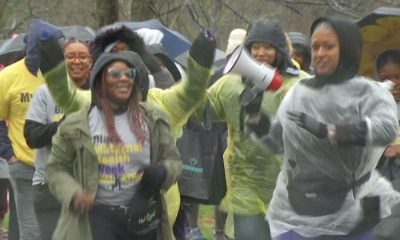U. S. News
St. Louis Army Vet Was Left to Fight Eviction by Phone

An early evening rain storm had just passed through St. Louis by the time Eddie Lee Logan, 53, took a seat on the front porch of his north side home.
Logan, formerly a homeless Army vet, took a few moments to savor the last-minute legal victory that will keep a roof over his head for at least another month — and possibly have widespread repercussions for thousands of other financially strapped Missouri tenants fighting to stay in their homes.
In late August, Logan lost an eviction trial held in St. Louis Circuit Court. The loss pushed him perilously close to being forced out of the crumbling house he rents along Cote Brilliante Avenue in the Wells-Goodfellow neighborhood.
Because the circuit court had shut down to combat the spread of COVID-19, Logan’s trial was held virtually, via video teleconference.
It took place less than two months after Logan began withholding rental payments because of the aging house’s long list of worsening problems, including a leaky roof, lopsided foundation and mold in the basement. The landlord refused to make necessary repairs. In June, property management firm E. Wright Investment Strategies LLC filed an eviction case against Logan.
“It was like, ‘Wham, bam, you out next week,’” Logan says.
Problem was, Logan tried three times to submit exhibits as part of his trial defense to the shuttered courthouse but each time was rebuffed. He tried mailing in the exhibits to the court, but they arrived after the trial was set to start.
On the day of the trial, August 17, Logan was unable to access WiFi from his house for the video conference. He tried his phone and then his wife’s phone, but neither could access the video. That forced him to dial in to the conference and listen to the audio. It didn’t go so well, he recalls.
“I look at this way, as I told my wife, all the technology I don’t know,” Logan says. “If I’m 53, what about the people (age) 61, just finding out about this web site, trying to get their flip phone?”
Logan asked the judge to continue the trial to a later date so that his exhibits would have time to arrive by mail. The judge denied the request and entered the judgment against Logan.
Logan faced eviction within ten days.
With the help of ArchCity Defenders, a legal aid organization, Logan appealed the judgment to the Missouri Court of Appeals, arguing, in effect, that his “due process rights in this hearing were violated entirely,” according to John Bonacorsi, the ArchCity attorney who now represents Logan.
Logan was unable to see the evidence against him, nor was he able to see the plaintiff’s attorney or the judge presiding over the case, Bonacorsi notes.
“And Mr. Logan is literally unseen,” Bonacorsi says. “I think there are very legitimate questions that this can even be done constitutionally in a remote context.”
The appeals court denied the writ for a new trial, immediately leading Bonacorsi to file an appeal to the Missouri Supreme Court, which also rejected the case.
But on the day before the ten-day eviction deadline was set to expire, the judge in Logan’s trial tossed out the judgment from a few days earlier and granted a request for a new trial set for early October.
The prospect of evicting people from their homes during the worst pandemic in a century, and the worst economic collapse since the 1930s has aroused the attention of both judges and public health experts.
On Monday, St. Louis Circuit Court Presiding Judge Rex Burlison extended by another month the moratorium on tenant evictions in St. Louis that he had imposed in early August. Burlison cited health concerns related to the pandemic and the need to allow city residents the time needed to apply for $5.4 million in CARES Act housing aid.
A day later, on Tuesday, the federal Centers for Disease Control and Prevention ordered a temporary eviction ban through the end of 2020 that halts residential evictions “to prevent the further spread of COVID-19.” The eviction ban applies to people who lost work because of the pandemic, can’t pay their rent and are unable to find other housing options.
Bonacorsi says the CDC eviction ban is an important first step. But ultimately Congress and the White House need to agree on another major pandemic financial bailout that will enable people to stay in their homes, according to Bonacorsi.
“There needs to be a bailout, so the landlords and the people can get compensated,” he says.
-

 Local News2 weeks ago
Local News2 weeks agoReunited Afghan family in Rochester after almost ten years apart
-

 Local News2 weeks ago
Local News2 weeks agoResidents in Rochester are irritated by careless driving
-

 Local News1 week ago
Local News1 week agoStrong Hospital has a significant police presence during a search for a man from Livingston County
-

 Local News2 weeks ago
Local News2 weeks agoReactions from RG&E and community supporters to Monroe County’s denial of funding for a public utility study
-

 Local News2 weeks ago
Local News2 weeks agoThe new Senate resolution is ‘encouraging’ for the widow of the Taliban-detained guy from Dansville
-

 Local News1 week ago
Local News1 week agoNumerous people walk to bring attention to Black maternal mortality
-

 Local News1 week ago
Local News1 week ago22 exotic animals left behind in a downtown Rochester building following the eviction of the tenant
-

 Local News1 week ago
Local News1 week agoBy April 29, RCSD intends to name an interim superintendent




